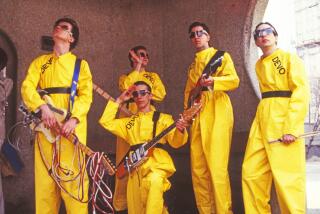242’s Machine-Powered Attack : The Belgian group’s approach has taken it from Europe’s underground club circuit to America’s national dance charts and the ‘Lollapalooza’ tour.
- Share via
Front 242, one of the most influential bands on the electro-pop and industrial dance scene, is the first to admit that it’s not exactly packed with musical virtuosos.
“None of us are real musicians,” Patrick Codneys, the keyboardist in the Belgian band, says in bumpy English.
“We’re more into touching knobs and working with machines. We associate more with sounds than we do with notes. Initially, that’s a big handicap, but with experience and maturity, it’s another way to make music.”
Front 242’s experimentation with technology and beat forged new paths in ‘80s electronic dance music and made the band an integral force in the world of synthesized pop. The group’s machine-powered approach has been so successful that its sound has traveled from Europe’s underground club circuit to America’s national dance charts.
The quartet’s new Epic Records single, “Religion,” just entered those charts and the band has been invited to join the prestigious “Lollapalooza” tour, which begins its summer trek on June 18 in Vancouver.
And thanks to an abundance of material, the band is releasing two albums in connection with the tour: the just released “06:21:03:11 Up Evil” and the equally cryptically titled “05:22:09:12 Off” in August.
The group’s success suggests growing mainstream acceptance--something that was far removed from the concept of the band when it was started 12 years ago in the Belgian town of Rillaar. The idea then was sci-fi dance music.
Electronics whiz Daniel Bressanutti founded Front 242 and recruited keyboardist Codneys and singer Jean-Luc De Meyer a year later. (Richard JK, the band’s second singer, came in around 1983.)
“In Belgium, there is no music industry, no structure,” says Codneys, 35. “You don’t even have the choice of having friends as musicians because there are so few. Each member of the band was working alone with machines as one-man bands. We decided to put our ideas together.”
Even then, Codneys saw the project more as a collection of “attitudes and ideas” than a formal band.
The group’s “attitudes and ideas” were largely sparked by a ‘70s German movement called Anti-Rock. Forged by bands like Can and Kraftwerk, the dehumanized and seemingly automated compositions were a strong reaction against the decadent mainstream rock music of the time.
But like rap in its early stages, electronic and industrial music were shunned as “non-music” by rock traditionalists.
Replies Codneys: “I don’t want to sound pretentious when I say this, but what is music? Is it notes and harmony only? In that case, no, we are not doing music. But if it is putting together all the sounds of our environment, then yes--Front 242 makes music.”
Following mostly in the footsteps of Kraftwerk, Front 242 took stark electronic sounds and merged them with a lighter, more tuneful Euro-pop. While the band added more accessible beats to the quirky bleeps and blips, it also dropped radical political messages into the robotic mix.
On album these days Front 242 is more powerful than ever, and on “Lollapalooza” the group--which signed with Epic in 1989 after four years with the Chicago industrial label Wax Trax!--will be augmenting the energy of lead singer De Meyer with some dancers, to add to the physicality of the performance.
“It’s important to have that energy,” stresses Codneys. “It’s all very interactive--like we’re bringing the music to life.”
More to Read
The biggest entertainment stories
Get our big stories about Hollywood, film, television, music, arts, culture and more right in your inbox as soon as they publish.
You may occasionally receive promotional content from the Los Angeles Times.











